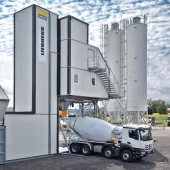Low-carbon concrete reinforces Dawlish sea defences

Hanson supply bespoke mix capable of withstanding storms whilst reducing CO2 by two-thirds
HANSON have supplied 4,600 cubic metres of specialist low-carbon concrete to support BAM Nuttall and Network Rail in completing the first and second phase of building the new Marine Parade sea wall in Dawlish, Devon.
The bespoke mix uses Regen GGBS to create a low-carbon concrete that is strong enough to withstand storm-force winds whilst reducing the amount of carbon generated by two-thirds.
It is being used to deliver vital coastal protection works to safeguard the future of the railway line while supporting the project’s collective commitment to tackling climate change by reducing the associated carbon emissions.
BAM Nuttall site agent Jack Brookes said: ‘From the earliest phase of this project, we have considered how this scheme can limit its environmental impact without compromising the strength and resilience of the structure.
‘The final design uses piles buried deep in the bedrock to create stability for the structure. Those piles are protected by prefabricated facing panels created off site and reinforced by concrete poured in behind the visible section of wall.
‘We identified Hanson’s low-carbon concrete as an innovative product that could help us to reduce our carbon impact by two-thirds while retaining the strength of traditional concrete.
‘We worked closely with Network Rail to ensure that the material is approved for use on Britain’s railway and look forward to seeing it being used in more major civil engineering schemes.’
Hanson Concrete area general manager David Cullimore added: ‘We have worked closely with BAM Nuttall to design a pumpable, low-carbon concrete which containes Regen GGBS to help improve sustainability credentials while maintaining durability in aggressive conditions.
‘Working in partnership with BAM and Network Rail, we frequently overcame difficult logistical, technical and operational challenges created by pouring large amounts of high-specification concrete up to 200m through the night in very short tidal windows.’
Hanson will supply a further 4,500 cubic metres of low-carbon concrete to the project, which, in total, will save 1,130 tonnes of CO2 from entering the atmosphere compared with traditional concrete – the equivalent of flying 668 passengers from London to New York and back.









